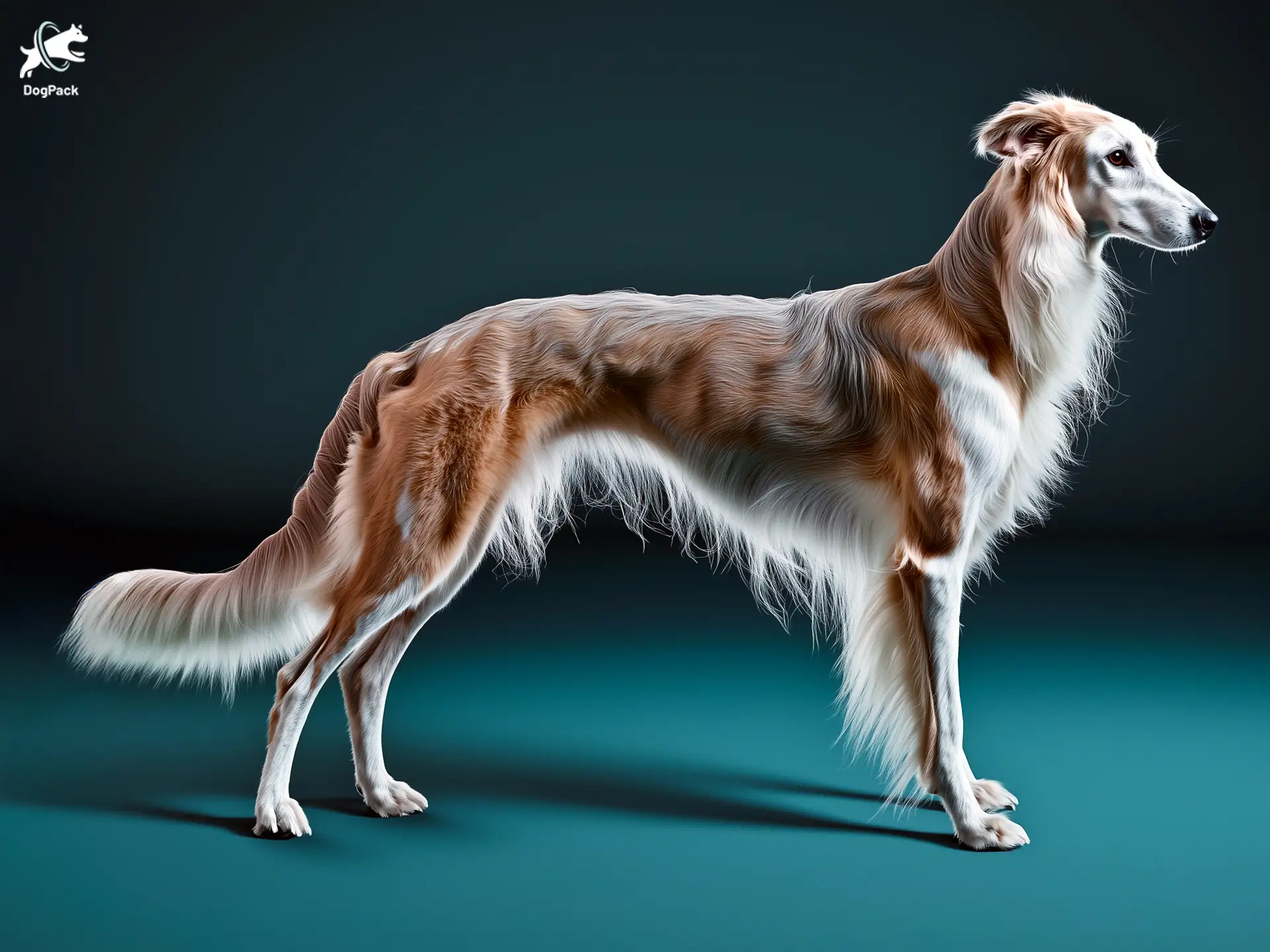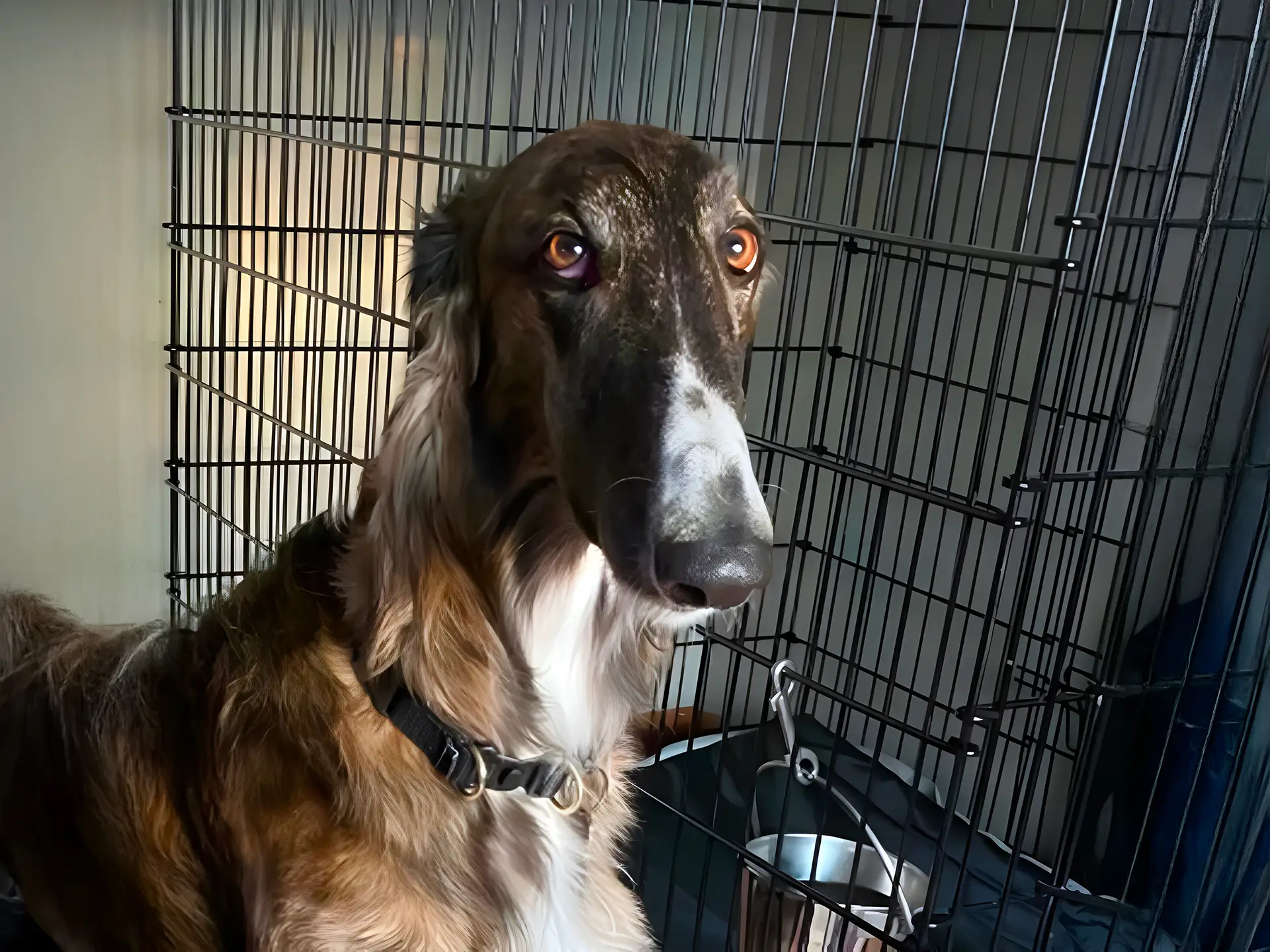Borzoi Dog Breed Info & Overview
Graceful and dignified, the Borzoi is a breed that exudes elegance. Originally from Russia, these sighthounds were bred for speed and endurance to hunt wolves across the vast steppes. With their silky coats and gentle dispositions, Borzois combine aristocratic charm with a laid-back, affectionate nature that’s hard to resist.
Characteristics
Pictures
Breed History
The Borzoi’s roots trace back to 17th-century Russia, where they were bred by aristocrats for wolf hunting. Developed from Arabian greyhounds and Russian herding breeds, they became a symbol of nobility. The breed’s name “Borzoi” translates to “fast” in Russian, reflecting their incredible speed and agility.
During grand hunting expeditions, Borzois showcased their prowess alongside Russian nobility. Their ability to chase down wolves made them invaluable assets. The breed’s popularity soared until the Russian Revolution, which led to a decline in their numbers.
Thankfully, Borzois were preserved by enthusiasts who exported them to Europe and the United States. Today, they are cherished for their beauty and gentle nature rather than their hunting skills.
Temperament, Personality
Borzois are known for their calm and gentle demeanor. They form strong bonds with their families but can be reserved around strangers. These dogs are typically quiet and well-mannered indoors, making them delightful companions.
Their independent streak might come off as aloofness, but it’s just part of their sighthound heritage. Early socialization is key to nurturing a well-rounded Borzoi. They generally get along with other dogs but might see smaller pets as prey due to their high prey drive.
Patience is essential when training a Borzoi, as they can be sensitive. Positive reinforcement methods work best to bring out the best in this elegant breed.
Physical Characteristics
The Borzoi is a large, slender dog with a graceful silhouette. Their long legs and narrow bodies are built for speed, allowing them to chase swiftly over open terrain. They have a distinctive Roman nose and expressive eyes that add to their aristocratic appearance.
Their silky coat can be flat, wavy, or curly, and comes in a variety of colors, including white, gold, tan, and gray. The luxurious fur provides protection against harsh weather, a nod to their Russian origins.
Despite their size, Borzois carry themselves with a light, effortless gait. Their overall appearance combines strength and elegance in a way that’s truly unique.
Health Issues
Borzois are generally healthy but are prone to certain breed-specific health issues. One common concern is bloat, a serious condition affecting deep-chested dogs. Owners should be cautious about feeding routines and avoid vigorous exercise after meals.
They may also be susceptible to heart conditions like cardiomyopathy and certain cancers such as osteosarcoma. Regular veterinary check-ups are crucial to catch any potential problems early.
Eye conditions like progressive retinal atrophy can occur, so vision screenings are recommended. Responsible breeders often test for these issues to ensure the healthiest Borzoi puppies.
Grooming Needs
The Borzoi’s beautiful coat requires regular care to keep it in top condition. Weekly brushing is essential to prevent mats and tangles, especially since they shed heavily during seasonal changes. A slicker brush and a comb work well for their silky fur.
Bathing should be done as needed, typically every few months, unless they get particularly dirty. Their fast-growing nails should be trimmed regularly to prevent discomfort.
Don’t forget dental hygiene—brushing their teeth several times a week helps prevent gum disease. Overall, grooming a Borzoi is a moderate commitment that keeps them looking regal.
Exercise Requirements
While the Borzoi is a sighthound built for speed, their energy levels are moderate. A daily hour-long walk or play session suffices to keep them happy. They enjoy sprinting in safe, enclosed areas but are generally content to lounge at home.
Due to their hunting instincts, it’s important to keep them on a leash during walks. They might take off after small animals if given the chance. Mental stimulation through interactive toys can also help keep a Borzoi engaged.
Remember, a bored Borzoi can become destructive, so regular exercise is key to a well-behaved companion.
Training Tips
Training a Borzoi requires patience and a gentle approach. They are intelligent but can be independent thinkers, so consistent, positive reinforcement is most effective. Harsh methods can lead to a withdrawn or stubborn dog.
Early socialization is crucial to help them become well-adjusted adults. Exposing them to different people, environments, and other animals will reduce timidness or overexcitement.
Obedience classes can provide structure and help strengthen the bond between you and your Borzoi. Keep training sessions short and engaging to maintain their interest.
Nutrition, Diet
Feeding a Borzoi requires attention to their unique dietary needs. Due to their risk of bloat, it’s recommended to feed them two smaller meals a day rather than one large one. High-quality dog food formulated for large breeds is ideal.
Portion sizes vary based on their weight and activity level but generally range from 4 to 8 cups of dry food per day. Monitoring their weight is important to prevent obesity, which can strain their joints.
Consulting with a veterinarian can help tailor a diet plan that suits your Borzoi’s specific needs, ensuring they receive all necessary nutrients.
Adoption, Breeders
If you’re considering adding a Borzoi to your family, seek out reputable breeders who prioritize health and temperament. The Borzoi Club of America provides resources and breeder referrals.
Adoption is another wonderful option. Organizations like National Borzoi Rescue Foundation specialize in rehoming Borzois in need. They can help match you with a dog that fits your lifestyle.
Avoid purchasing from puppy mills or unscrupulous sellers. Responsible breeders and rescues will happily answer your questions and provide health clearances.
Family Pet?
Borzois can make excellent family pets, especially in households with older children. Their gentle nature and quiet demeanor are well-suited to a calm environment. They may not be ideal for families with very young kids due to their size and sensitivity.
They generally get along with other dogs but might not be the best fit for homes with small pets like cats or rabbits. Their hunting instincts could pose a challenge in such situations.
With proper socialization and training, a Borzoi can become a cherished member of the family.
Right For You?
Is the Borzoi the right match for your lifestyle? If you appreciate a quiet, independent dog that exudes elegance, this breed might be for you. They thrive in spacious homes where they can stretch out and prefer a calm, loving environment.
Potential owners should be prepared for their grooming needs and ensure they have a secure area for exercise. If you’re looking for a clingy, highly energetic companion, the Borzoi might not meet those expectations.
Ultimately, this breed offers a unique blend of grace and companionship for the right owner.
Conclusion
The Borzoi is a breed like no other—combining noble history, stunning looks, and a gentle spirit. They’re best suited for owners who appreciate their independent nature and can meet their specific care requirements. If you’re seeking a dignified companion with a touch of aristocratic charm, the Borzoi might just be your perfect match.
FAQs
-
Are Borzois good apartment dogs?
While Borzois are generally calm indoors, their large size and need for space make them less suitable for apartment living. They thrive in homes with ample room and a secure yard.
-
How much exercise does a Borzoi need?
Borzois are active dogs that need daily exercise, such as long walks or runs. While they are calm indoors, regular physical activity is essential to keep them healthy and prevent restlessness.
-
Can Borzois live in homes with children?
Borzois can live with children, but due to their size, supervision is necessary around younger kids to prevent accidental knocks or injuries. Their gentle nature makes them suitable companions for older children.
-
Do Borzois bark a lot?
Borzois are generally quiet dogs and are not known for excessive barking. They tend to bark only when necessary, making them suitable for owners who prefer a quieter pet.
-
Are Borzois prone to separation anxiety?
Borzois can develop separation anxiety if left alone for extended periods, as they bond closely with their families. Regular interaction and mental stimulation can help prevent anxiety-related behaviors.
Breed Ratings
Borzois are smart but may be independently minded, requiring thoughtful training approaches.
They enjoy playtime but are generally more reserved compared to other breeds.
Moderate energy levels with bursts of speed when needed; they appreciate daily walks.
High shedding, especially during seasonal changes; regular grooming helps manage it.
Strong prey drive due to their sighthound heritage; caution needed around small animals.
Moderate grooming needs with regular brushing to maintain their coat.
Trainable with patience and positive methods; can be sensitive to harsh techniques.
They prefer company and may become anxious if left alone for long periods.
Typically quiet dogs that rarely bark or howl.
Minimal drooling compared to other large breeds.
Generally get along well with other dogs when properly socialized.
Generally healthy but prone to certain breed-specific health issues.














